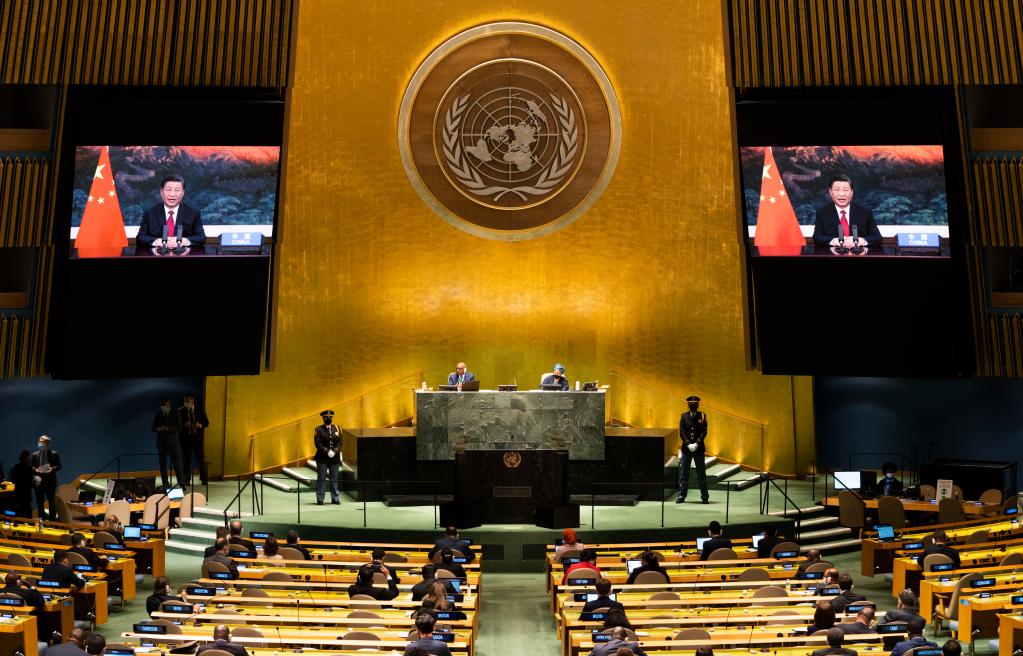Analysts hail Xi's climate commitments

Pledges are a 'monumental signal' to accelerate shift to renewable energy

China's pledge to help other countries with green energy while ceasing to build new coal-fired power projects abroad will help other developing nations in Asia reduce their dependence on coal and meet their commitment to cut carbon emissions, analysts said.
They said that China's commitment to low-carbon growth is crucial as Southeast Asian governments prepare their climate commitments ahead of the 26th United Nations Climate Change Conference (COP 26), which will be held from Oct 31 to Nov 12 in Glasgow, Scotland, United Kingdom.
Analysts hailed Chinese President Xi Jinping's speech at the general debate of the 76th session of the United Nations General Assembly, in which he said that China will support other developing countries' green and low-carbon energy projects.
"If the global fight against coal was a novel, President Xi's statement is the paragraph that opens the epilogue," said Renato Redentor Constantino, executive director of the Institute for Climate and Sustainable Cities, a Manila-based climate policy think tank.
Constantino said Xi's statement is a "monumental signal" to Southeast Asia's governments to accelerate the region's transition to renewable energy.
"After decades of addiction to fossil fuels, it will certainly be challenging for governments in the region to phase out coal in a time frame that allows Southeast Asia's power sector to establish irreversible pathways to modernization. But having China as a partner will be nothing less than a massive boost that can transform visions into reality," he said.
Cesar Carlito Baclagon, regional finance campaigner for Asia of 350.org, an international environmental group, congratulated China on its "wise decision" to stop support for external coal investment.
"A push against coal power plants sends a clear message that China and the rest of Asia, especially member countries of the Association of Southeast Asian Nations, can play a leadership role in building a fossil-free future," Baclagon said.
He expressed his hope that Xi's statement will encourage the regional bloc "to push other wealthy countries to step up and get their financial institutions to do better" at the COP 26.
Tata Mustasya, climate and energy campaign strategist at Greenpeace Southeast Asia, welcomed China's move, noting that financing from China and other wealthier countries is needed to build green energy infrastructure in Southeast Asia.
"The key is energy transition, because 60 percent of global emissions come from the energy sector," Mustasya said.
Prior to the pandemic, Southeast Asia was one of the world's fastest growing regional economies, boosting energy demand. The International Energy Agency said that growing ownership of household appliances and air conditioners, as well as increasing consumption of goods and services, have increased electricity demand by more than 6 percent annually over the past 20 years.
Greater demand for electricity has also expanded the construction of coal power plants. The IEA said Southeast Asia is one of the few regions of the world where coal-fired generation has been expanding, with close to 20 gigawatts of new coal-fired generating capacity under construction, mostly in Indonesia, Vietnam and the Philippines.
Some Southeast Asian governments have made a commitment to decarbonize, but analysts noted that such statements have to be matched with concrete policies and programs.
Indonesia, Southeast Asia's biggest economy, is also among the world's biggest coal producers and exporters. Indonesia is also the biggest electricity consumer in the region and coal accounts for around 60 percent of the country's electricity generation. The capital city of Jakarta alone is surrounded by more than 20 coal-fired power plants within a 100-kilometer radius and is one of the most polluted cities in Southeast Asia, according to Greenpeace.
State-owned utility Perusahaan Listrik Negara said in May that it will stop building coal-fired power plants after 2023 to meet Indonesia's goal to slash emissions. But environmental experts believe that the country must stop building power plants now and start investing in renewable energy sources to meet its climate goals.
In the Philippines, Energy Secretary Alfonso Cusi said last year that the country is imposing a moratorium on new coal-fired power plants and will allow 100-percent foreign ownership in large-scale geothermal exploration, development and utilization projects.
In Malaysia, Prime Minister Ismail Sabri Yaakob highlighted low-carbon development in a plan he presented to the nation's legislature on Sept 27.
He said carbon pricing and a carbon tax will be introduced so that Malaysia can become carbon neutral by 2050.
Matthew Ashfold, associate professor and head of the School of Environmental and Geographical Sciences at the University of Nottingham Malaysia, said the prime minister's commitment to transform Malaysia into a carbon-neutral country indicates that there's a "wider consensus" in ASEAN to move away from coal-powered plants over the longer term.
Ashfold said if ASEAN wishes to meet its commitment to the Paris Agreement, it has to reduce its dependence on coal as soon as possible given the "multidecade lifetimes" of power plant infrastructure.
"So ideally new green energy infrastructure is not only seen as an alternative to new coal power stations, but it will be sufficient to also allow the early retirement or retrofitting of existing coal power stations," he said.
Ashfold said that apart from meeting climate goals, a shift to renewable energy sources can reduce health impacts from fossil fuel-related air pollution in ASEAN member nations, citing a February 2020 report from Greenpeace which revealed that air pollution has caused more than 100,000 premature deaths in Southeast Asia.
"Such huge, diffuse costs are typically not accounted for when evaluating the economic case for investments in fossil fuel technologies," Ashfold said.
- China's 'medicine capital' company goes fully automated
- Beijing prosecutors helping errant minors to get back on track
- Copyright Society of China wins approval to be observer of world intellectual property body
- China sets sights on greener, smarter, and more globally connected maritime future
- Protected bird Chinese pond-heron spotted in Chongqing
- Lotus transform wetland park in Chongqing into canvas of pink and green hues





































